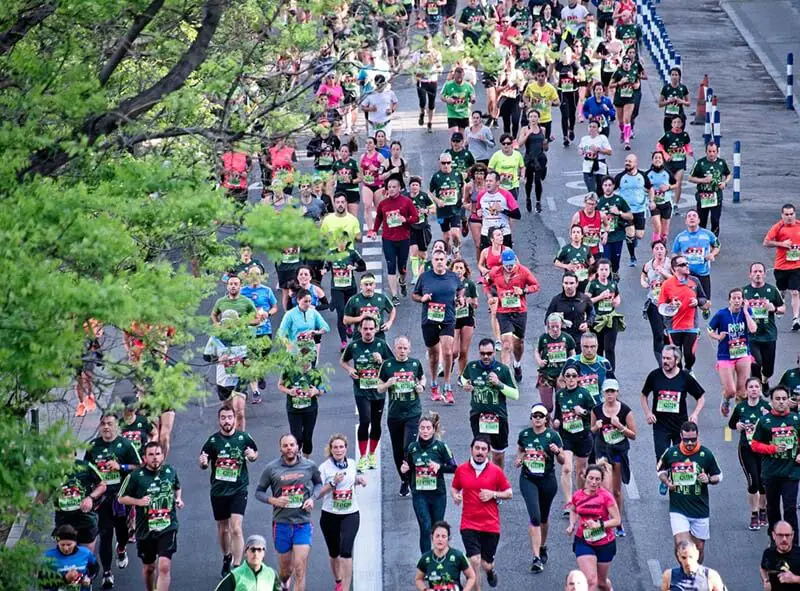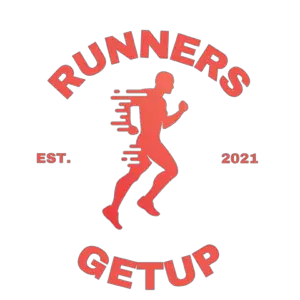This post contains affiliate links.

The fact that you’re here means that you either signed up for a marathon thinking it’ll just be like any other run or you want to test yourself to your absolute limit. That said, you want to find out if it’s possible to run a marathon without training.
It is possible to run a marathon without formal training if you are an experienced runner. However, running a marathon without training may lead to long-term injuries and delayed recovery. It is recommended that you train for at least four to six months before running a marathon.
It’s cool to be able to say you’re able to run a marathon without training. But I’m certain it’ll be a miserable experience. Ahead, we will discuss what marathon training is and how it differed from other training. We will also look at why you shouldn’t run a marathon without training and the risks that come with it. And in case you’ve already signed up for one, we will look at what your options are.
What Is Marathon Training And How Does It Differ To Other Training
“I’ve been running regularly, biking, swimming, and lifting. I should be able to run a marathon right now” —says everyone who ends up hating the sport of running after their first marathon.
Marathon training is very different from regular running or even HIIT and other forms of exercises out there.
Sure, being physically fit helps. It gives you the foundation your need to handle marathon training. But even the fittest man on earth will have to train for a marathon to perform well on a marathon.
As a general rule, marathon training is progressively adding mileage to your weekly runs to train your body to handle running for longer miles. The goal is to be able to run 20 miles or 3 hours straight during the peak of your training to make sure you are ready for a marathon.
Marathon training is different for everyone. Someone who has never done any physical exercise his entire life may need a full 6 months of training to be marathon-ready while the guy next door who’ve tried every kind of exercise there is might only need 3.
A professional swimmer or a cyclist may get away with running just twice a week while a strength-athlete who’s never done some serious cardio may need to run at least 3 times a week.
But no matter what your previous experiences are, a marathon is a different beast. You’ll have to train for it to be able to handle it.
In the fitness world, there is a principle that governs our training. It’s called the SAID principle. SAID stands for Specific Adaptations on Imposed Demand. It is also known as the principle of specificity.
Basically, it says that our body adapts to the type of stress that we apply to it. Therefore, the only way to adapt to running is by running. To go even more specific, the only way to adapt to long-distance running (such as a marathon) is to run long distances.
Why You Shouldn’t Run A Marathon Without Training
Aside from it’s very unlikely that you’ll finish it, there are so many reasons why you should never run a marathon without training for it.
It will take a very long time for your body to recover. Marathon training does not only train you how to run long. It also prepares your body for the impact that your body will have to absorb in that 26.2-mile stretch.
Without training for the marathon, your body is not very efficient from recovering from “that kind” of damage.
You will likely get hurt or injured. According to an article published by Yale Medicine, 50 percent of regular runners get hurt each year. And in most cases, the injuries are caused by overuse injuries.
Think about it, those are “regular runners”. Their bodies are used to running but they still got injured from running not even a marathon distance. Imagine what running a marathon will do to someone who has never trained for it. There’s a very high chance you’ll end up in a hospital with multiple injuries.
You will hate the sport. Running a marathon without training will feel so painful and miserable that it’ll ruin your experience and you’ll end up hating the sport.
You will hit the wall early. If you’ve been searching about marathons, I’m pretty sure you already encountered “the wall” in some of the articles that you’ve read. The wall is the point where your glycogen stores are already depleted and your body will use other forms of energy to function.
It usually occurs at the 20-mile mark for most athletes. But if your body isn’t efficient at using energy, you might hit the wall much sooner. When that happens, the following miles will feel like an uphill battle. It’ll be miserable both physically and mentally.
You’re not mentally ready for it. Marathon is a very mentally demanding task. Sure, you can listen to music and podcasts to try to drift your mind and forget about the pain for a few miles, but that’s not going to help you past the 10-mile mark.
When you’re depleted and are left alone with your own mind, there’s a very high chance that you’ll talk yourself out of running the full distance if you haven’t trained your mind to push through.
It’s a disrespect to the sport. Runners from all walks of life give their absolute A-game when they train for a marathon. It’s literally sweat, blood, and tears. A lot of sacrifices are made to cross that finish line.
Not training for the marathon is a huge disrespect for those people. It’s like telling them “I’m able to achieve what you’ve achieved with little effort”. Anyone who has trained for a marathon will take offense in a statement like that.
Health Risks Of Running A Marathon Without Training
That said, here’s a list of some of the possible risks that could happen if you run a marathon without training.
- Plantar fascitis
- Stress fractures
- Shin splints
- Muscle strains
- Long-term joint damages
- Runners’ knee
- Rhabdomyolysis
- Dehydration
- Hyponatremia
- Muscle cramps
- Dizziness, nausea
- GI symptoms
What’s The Shortest Time To Train For A Marathon
- Beginner (sedentary): at least 5 months
- Those who do other forms of endurance exercises (like swimming and cycling): at least 3 months
- Experienced runners (more than 1 year) or those who’re able to run 15km nonstop: at least 8 weeks.
The shortest amount of training for a marathon carries from person to person.
If you’re a beginner and have never run consistently your entire life, I recommend that you train for at least 5 months 3 times a week focusing on building your aerobic capacity and endurance.
Other sources will say you can get away with 4 months of training if you’re a beginner, but I think 4 months is a little short. You still have to build your fitness up from scratch which takes a long time. Not to mention you still have to adapt to new eating and training habits and make tweaks to your running form.
Your goal as a beginner is not to end up at the podium. Instead, your goal is to be able to finish a marathon. Doesn’t matter if it takes you 5-6 hours. As long as you finish the marathon.
During your training, you should be able to run for 3 hours straight or accumulate 18-20 miles on a single run during your peak week.
If you’re used to other forms of endurance exercises such as cycling and swimming but are never a fan of running, you may not need that long to prepare your body for a marathon. You can get away with 3 months of training to prepare your body for running and improve your running form.
At this point, considering you’re swimming or cycling regularly, you’ve already built your cardiovascular fitness. You also probably have well-defined muscles that can help support your joint.
The only thing left to do is to use those muscles and that cardiovascular fitness to running. The only way to do that is to run consistently.
I suggest that you start with a weekly mileage of 20-25 miles and gradually increase it by no more than 10% each week.
Your goal for your training is to learn the most efficient running form, build endurance, and get used to running.
For those who have been running consistently for more than a year or those who can run 15km without walking, you can get away with as little as 8 weeks of training.
You’ve already built your endurance, you probably already have good running form, and your body already knows how long-distance running feels.
The only thing left to do is to build it all up to a marathon level and prepare yourself mentally for a marathon.
Your goal, at this point, is to run the whole marathon without walking or to beat your previous time. That’s a decent goal to set for someone who runs regularly.
Has Anyone Run A Marathon Without Training?
A quick google search of running a marathon without training will give you a bunch of stories that people claiming to run a marathon without training.
Like Pat Hughes who shared in an article that he signed up for a marathon with only a 3-day notice after his mom signed up for a half-marathon and decided to do the full distance.
A Reddit thread also revealed a runner who decided to go ahead and run a marathon without “proper marathon training” after he was injured mid-training and wasn’t able to run for 2 months prior to the Boston Marathon.
He added that it wasn’t his first marathon and if it weren’t the Boston Marathon, he would’ve withdrawn from the race. But Boston Marathon is special so he decided to give it a go. He’s been going to the gym and cycling long distances during the 2-months that he wasn’t running.
What’s not in the headline of all these stories is that they already experienced running sub-marathon distances. All of them have been fairly active and have been doing other forms of exercise for a long time.
It’s important to point out that there’s a huge difference between a sedentary man/woman who decided to run a marathon without training and an experienced runner or athlete who had no formal “marathon training program” prior to running a marathon.
And even with their impressive athletic background, those athletes who run a marathon without formal marathon training still claimed that they felt miserable during the run. That’s how difficult running a marathon is.
It’s basically impossible for a sedentary person to run a marathon with little to no training. I don’t care how mentally strong you are, a marathon is a different beast and it deserves the respect and sacrifices that only true runners will understand.
Recommended Gear
I understand that looking for the right running gear is difficult. There are hundreds of product reviews out there recommending 10 or more products that do not seem to help narrow down your buying decision.
That is why I created a recommended product page with only 1 to 3 recommendations per running gear. That way, it’ll help narrow down your choices to only a few products that are guaranteed to give you great value for your money.
I have researched and tested these products and I’m constantly updating the page if I see something better. You can visit the page by clicking this link.
